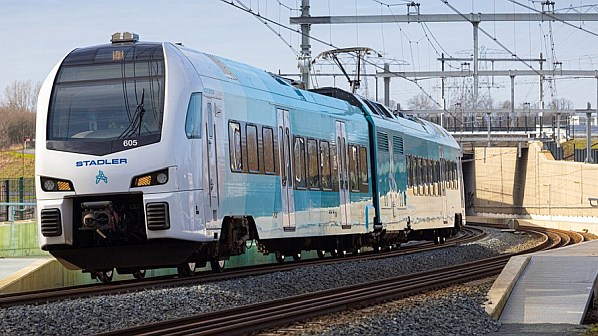DUTCH infrastructure manager ProRail and Arriva Netherlands conducted trials with a battery-electric hybrid Stadler Wink train on the Almelo - Hardenberg and Arnhem - Doetinchem routes on February 24 and 25.
The trials have been carried out in collaboration with the provinces of Fryslân, Overijssel and Gelderland, which all have public transport authorities for regional train operations.
An existing Wink train was used for the testing. These are already fitted with batteries which store energy that is released during braking. On the modified train, the energy stored by the batteries is used to drive the train.
The trials measure the battery performance, drop in power and recharging during journeys at various speeds. They are also monitoring the switch from overhead line power to battery power and from battery power to electric. Acceleration of the train from stations and energy consumption will also be measured.
Ms Dorothé Wennekendonk, ProRail regional director, says with 572km or 15% of the Netherlands’ rail network not yet electrified, battery trains, in combination with partial electrification, are a promising option as an alternative to full electrification.
Diesel-battery hybrid
Trials with a diesel-battery hybrid Wink will be conducted this autumn by ProRail and Arriva, in collaboration with the same provinces.
Stadler will modify an Arriva Wink DMU enabling it to operate on electric power generated from the battery, as well as diesel. The diesel motor will fuelled by hydrotreated vegetable oil (HVO) to further reduce CO2 emissions.
Trials will be conducted on the Almelo - Hardenberg, Leeuwarden - Harlingen and Leeuwarden - Stavoren routes, with the Arnhem - Doetinchem line also being considered.
Arriva has a fleet of 18 Wink hybrid two-car trains (plus a power pack), and these can be modified into a BEMU.

